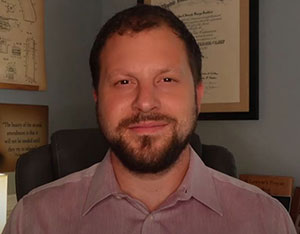 Hi, I'm firearms attorney Gilbert Ambler, and I'm back because the Minnesota Supreme Court offered a decision this week that arguably is very contrary to the Second Amendment in that the decision requires someone to first attempt to retreat if they have a reasonable opportunity to do so prior to even threatening the use of force. We're going to talk about why this is contrary to the Second Amendment, but before we dive into that, if you have not yet hit that subscribe button, what are you waiting for? Hit the subscribe button, like comment with your thoughts, share with your friends, and help us keep spreading this channel so that more and more people can keep understanding these important Second Amendment related concepts. Alright, the case we're talking about is the state of Minnesota versus Blevins. And in it the Minnesota Supreme Court issued a decision that upheld a second degree felony assault conviction for someone who had brandished a machete and then attempted to claim self-defense.
Hi, I'm firearms attorney Gilbert Ambler, and I'm back because the Minnesota Supreme Court offered a decision this week that arguably is very contrary to the Second Amendment in that the decision requires someone to first attempt to retreat if they have a reasonable opportunity to do so prior to even threatening the use of force. We're going to talk about why this is contrary to the Second Amendment, but before we dive into that, if you have not yet hit that subscribe button, what are you waiting for? Hit the subscribe button, like comment with your thoughts, share with your friends, and help us keep spreading this channel so that more and more people can keep understanding these important Second Amendment related concepts. Alright, the case we're talking about is the state of Minnesota versus Blevins. And in it the Minnesota Supreme Court issued a decision that upheld a second degree felony assault conviction for someone who had brandished a machete and then attempted to claim self-defense.
And the decision focused on the fact that the person brandishing the machete in the eyes of the justices could have reasonably retreated and instead of retreating, decided to pull out a machete and approach the other people that he claimed were the aggressors. Not once did the Minnesota decision, however, reference the Broom case, for example. And I thought this was interesting because I would argue, and in fact, gun owners of America has argued that the central component of the Second Amendment is the right to self-defense. There are multiple cases that stand for that proposition, including, for example, Heller, McDonald, Catano, and Broome. In fact, the Catano case is a great example. In the Catano case, the woman at issue there pulled a taser on her boyfriend who was being, or ex-boyfriend who being aggressive. The court there didn't say that she had to run away before using that.
Instead, they said the taser is a protected arm here, the machete would've been a protected arm, and yet the Minnesota Court determined that he should have attempted to retreat before he actually used or threatened to use that arm against people being aggressive. But this is contrary to Broome because if self-defense is the central component of the Second Amendment, then states that require additional requirements. States like Minnesota that say Before you can avail yourself of a self-defense claim, you must first attempt to retreat are running into a problem with the Second Amendment because now they're impacting the text of the Second Amendment, which again protects the central component of self-defense. And once they're running into the text of the Second Amendment, then we need to question whether they can rise and meet their burden to
Demonstrate a historical tradition dating back to the time of founding to justify the restrictions. Interestingly enough, the United States Supreme Court dating back historically even to, for example, 1895 in the case of the United States versus Beard struck down an Arkansas conviction based on one of the jury instructions. The jury instruction in that case indicated that somebody had a duty to retreat. The court struck it down saying he had a right to be there. He had a right to be in a public place where he was so therefore no duty to retreat. And they had a problem with that jury instruction. So the Supreme Court contrary to supporting what Minnesota has done, dating back to the 18 hundreds, and really we want to look before 1895, we want to look closer to the time of founding. We would have to see a tradition of similar restrictions in place, a tradition showing that you had to attempt to run away before even threatening to defend yourself with deadly force.
I don't think that the government can render such a historic or can show such a historical tradition. So now the question really is, were any Second Amendment arguments raised and just not addressed by the court? Because if they were raised in this case in Minnesota, the Blevins case, potentially they were preserved for appeal and there could be an appeal to the Supreme Court. If unfortunately the reason they were not mentioned was because the lawyers didn't raise them, then there would be a waiver and he would be unable to appeal that to the Supreme Court on the basis of a violation of the Second Amendment. So let's keep an eye on it because it would be very interesting to see an appeal come forth. But again, in order to get an appeal, he would've had to have raised the issue. Who knows whether he did that? If you enjoyed this content, hit that subscribe button. Until next time.
YouTube Video Link: https://www.youtube.com/watch?v=GR3fqDRxMBg
Credit: Gilber Ambler, The Commonwealth’s Gun Rights
